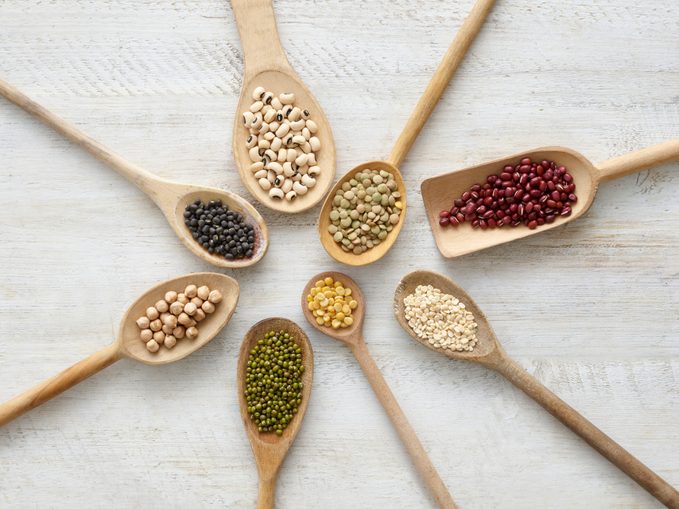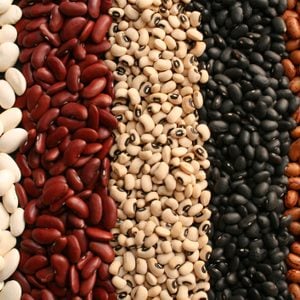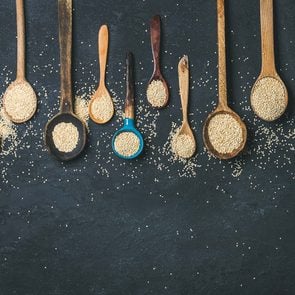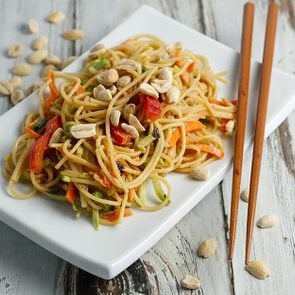Eat this Type of Protein to Live Longer
Updated: Mar. 08, 2021
You know that a protein-rich diet is important for building strong bones and muscles, but what about helping you live longer? Here's what the science says about plant protein and longevity.
Our editors and experts handpick every product we feature. We may earn a commission from your purchases.
Researchers are constantly hunting for the holy grail of lifestyles—one that prevents cancer, wards off heart attacks, and helps you live longer. Studies have long suggested that eating whole foods and exercising regularly facilitate healthy aging.
“There is no perfect diet prescription or one-size-fits-all approach to health and longevity, however, there are beneficial foods that help the body fend off disease states and enable a longer, healthier life,” says Vicki Shanta Retelny, RDN, culinary consultant, speaker, and author of Total Body Diet for Dummies.
“A balanced diet that includes all macronutrients”—carbs, proteins, and fats—”is important for optimal health and cardiovascular function,” adds Michelle Routhenstein, RD, a preventive cardiology dietitian, in New York City.
So what does a healthy balance of macronutrients look like? Research published in 2020 in the medical journal BMJ found that eating more protein, particularly plant protein, could add years to your life.
Linking protein and long life
In some ways, the link between protein and longevity is nothing new. Heart disease and cancer are the leading causes of death in the United States, according to the Centers for Disease Control and Prevention (CDC), yet previous research has indicated that eating more plant protein could lower your risk for both.
By eating foods that boost your heart health and your body’s ability to fight off cancer, you increase your odds of living a long, healthy life.
“These findings have important public health implications as intake of plant protein can be increased relatively easily by replacing animal protein and could have a large effect on longevity,” report the authors of the BMJ study.
Choosing the best protein
The authors, a group of American and Iranian researchers, set out to determine which sources of protein are most likely to help you live longer. Rather than gathering participants for a new study, they analyzed and compared results from 32 completed studies. That research, which took place over 32 years and included 715,128 men and women over age 18, all investigated how protein intake affects mortality rates.
The results were clear: Eat more plant protein to live a longer, healthier life.
(Here’s how to eat a whole food plant-based diet.)
Eating plant protein may lower your risk of a heart attack
Researchers found that people who had the highest intake of protein had a 6 percent lower risk of mortality during the study period compared with those with the lowest intake. Plant protein seemed to have an additional benefit, and was linked to an 8 percent lower risk of mortality overall and a 12 percent lower risk of cardiovascular death during the study.
Routhenstein says this is because “plant proteins are filled with many nutrients that help optimize blood vessel health.”
Protein-rich foods include meat, eggs, fish, and milk, and plant-based proteins include nuts, beans, tofu, and other foods.

Plant protein is linked to longevity
According to the research review, bumping up your daily plant protein intake by just 3 percent may lower your early-mortality risk by 5 percent.
Let’s say, for example, that you consume about 2,500 calories a day. To get the benefits of plant protein, you could swap 75 calories of a different type of food—a slice of bread, a small apple, or a stick of string cheese—for nuts or beans. (Here are more simple rules to follow to live to 100.)
Three tips to eat more plant protein
Whether you want to swap some of your favorite animal proteins for plant proteins or simply add more variety to your diet, it’s easy to incorporate heart-healthy nuts or beans into your day. Some healthy nut choices include walnuts, almonds, and pistachios. There are so many colorful and tasty beans to try including black, pinto, white, and garbanzo.
Try meatless Mondays
While eating more protein can help you live longer, eating too much red meat and other animal proteins could backfire by increasing your risk of weight gain and potentially cancer and disease. Having meatless meals can be healthier and just as enjoyable.
“In general, protein needs vary based on individual needs. However, replacing animal proteins with high-quality plant proteins and making at least one day a week meatless is a good idea from a health standpoint,” says Shanta Retelny. “This is not to say you have to banish animal proteins altogether. Cutting back on red and processed meats and adding more plant proteins into your weekly meal plans can offer a synergy of plant-based nutrients that can benefit your overall health.” Try these nutritionist-approved vegan protein bars, too.
If you are considering a completely plant-based diet, here are six ways to go vegetarian.
Enjoy a variety of plant protein sources
Depending on your personal and family history, Routhenstein recommended at least 5 to 7 servings of plant protein a week to truly reduce your risk of heart attacks and other causes of premature death. It’s easy to assume that plant protein is simply nuts or tofu—but if you’re going to be eating about one serving of plant protein per day, why not take this as an opportunity to try a variety of delicious new foods?
Shanta Retelny says, “Beans, peas, lentils, quinoa, tofu, tempeh, and seitan, as well as nuts and nut butters, contain protein and fiber—and some contain heart-healthy fats, which are good for overall health.” Try this high protein vegan stir fry recipe that’s easy and delicious.
Change your diet slowly
Rome wasn’t built in a day, and changing your eating habits takes time too. “It is important to note that some plant proteins may cause GI distress if it is not a routine part of your diet,” says Routhenstein. She recommends adding plant proteins gradually for “optimal implementation.”
She adds, “I would focus more on beans, tofu, legumes, and nuts, versus the bread, cereals, and pastas listed if insulin resistance or diabetes may be a risk factor for you.
A well-balanced diet is still key
Shanta Retelny and Routhenstein both caution against creating a diet built around one food group, even if it’s heart-healthy plant protein.
Shanta Retelny says, “We are tipping the scientific iceberg when it comes to understanding the benefits of plants for overall health and longevity.” She also points out that though this study suggests plant protein is a key to longer life, other studies have revealed that “regular fish eaters have a lower risk of death by all causes than those who do not eat fish as often.” In other words, more research is necessary to find a perfectly balanced diet for long life.
Routhenstein adds, “It is important to ensure that you are not only focusing on the foods to avoid but rather the foods you need to include.” So enjoy a heaping helping of nuts, tofu, or beans—but don’t leave behind fruits, vegetables, and other healthy plant-based foods.
Next up, find out why your body also needs fat to thrive.



